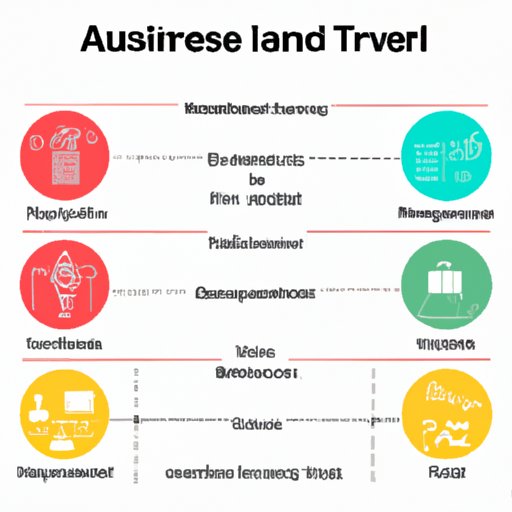
Introduction
As an Airbnb user, you may have wondered – just how does Airbnb make money? While many are aware of the platform’s booking and service fees, the specifics of its revenue model may be a mystery to some. In this article, we’ll provide you with a comprehensive guide on how Airbnb makes money and the advantages of its revenue model for the company.
A Step-by-Step Guide: How Airbnb Makes Money
Each Airbnb booking is broken down into three parts: the booking fee, the service fee, and the commission Airbnb takes from hosts. The booking fee is paid by the guest and is a percentage of the reservation subtotal. The service fee, which is variable, is a percentage of the reservation subtotal and is paid by guests. The commission Airbnb takes from hosts is a percentage of the reservation subtotal and is paid by the host.
The service fee and commission taken from hosts may seem high, but it covers the cost of the platform’s customer support, fraud prevention, and marketing expenses. Airbnb has been able to grow its customer base and brand recognition by investing in its marketing campaigns and delivering exceptional customer support.
While a host is a major part of Airbnb’s business model, the company still needs to take measures to ensure that its revenue is coming from multiple sources. Airbnb charges a commission to hosts, which is a percentage of each booking, but they are also looking for other ways to add value to both guests and hosts while boosting their revenue.
One way they are doing this is by introducing ancillary services, such as tours and experiences, to their platform. By offering a wider range of services on its platform, Airbnb is not only increasing its sources of revenue but also making its platform more attractive to a larger audience.
Comparative Analysis: Airbnb vs. Traditional Hotel Chain
One of the major differences between the Airbnb revenue model and the traditional hotel chain revenue model is that Airbnb is a host-based platform. Unlike hotels where the revenue is generated through room rates and on-site expenses, Airbnb focuses on generating revenue based on commission from bookings and other sources of income that support its platform.
By being a host-based platform, Airbnb has been able to create a more personal and unique experience for its guests. It has also enabled the company to provide a wider range of accommodations, including private homes, which traditional hotel chains can’t compete with. This has played a significant role in the platform’s success as a disruptor in the hospitality industry.
Case Studies: A Closer Look at Successful Airbnb Hosts and Listings
Airbnb’s revenue model works by taking a commission on each booking. This commission is taken out of the price paid by the guest. A successful Airbnb listing needs to offer a desirable and unique experience while being affordable. Some successful Airbnb host strategies include going the extra mile to ensure guests have an outstanding experience, offering unique experiences, and seeking feedback from guests to improve their services and accommodations.
Airbnb success stories such as those of Superhosts, who have built a reputation of providing great service and experiences to their guests, demonstrate how hosts can maximize their income potential on the platform as well.
Industry Analysis: Airbnb’s Sources of Income
In addition to its platform, Airbnb generates additional revenue through a variety of sources. Advertising revenue is one example, where the company places ads on its platform. This helps users looking for information about a destination, activity, or company, and companies that want to advertise their brand. Airbnb also generates revenue through its partnerships with airlines, car rental services, and travel agencies.
Furthermore, Airbnb is constantly looking for new ways to expand its platform offerings and generate additional revenue. This includes expanding into new markets, enhancing its user experience design, focusing on sustainability and long-term partnership deals.
Future Trends: How Airbnb Plans to Evolve and Expand
Airbnb is planning to expand into new markets, entering new industries and sectors, including the luxury accommodation space, where it will compete with traditional hotels and chains. The company is also looking to enhance its user experience by incorporating new features that will enable guests to have a more seamless and personalized experience.
In addition to expanding its offerings, Airbnb is also looking to focus on long-term partnership deals with companies in the travel industry, such as airlines and online travel agencies. By partnering with these types of companies, Airbnb can increase its reach and brand recognition, while generating more revenue from its business partners.
Conclusion
In conclusion, Airbnb’s revenue model can be broken down into three parts: the booking fee, the service fee, and the commission Airbnb takes out of each booking. By strategically investing in its marketing campaigns and enhancing its customer support, Airbnb has become a disruptor in the hospitality industry. By diversifying its revenue sources, investing in ancillary services, and new offerings, Airbnb is continually evolving and expanding its platform to provide more value to its users while boosting its revenue model.
If you’re considering utilizing Airbnb’s platform either as a guest or host, understanding its revenue model, and strategies can help you maximize your experience and benefits from using the platform.





